Introduction:
Business ethics encompass the principles, values, and standards that guide conduct and decision-making within organizations. It's a moral compass that influences how businesses interact with stakeholders, make decisions, and operate in society.
1. Core Principles of Business Ethics
Integrity: Upholding honesty, transparency, and moral principles in all dealings, fostering trust with stakeholders.
Responsibility: Acknowledging accountability to all stakeholders, including employees, customers, communities, and the environment.
Fairness: Ensuring impartiality, fairness, and equity in business practices, such as hiring, promotions, and customer interactions.

2. Ethical Decision-Making Frameworks
Utilitarianism: Assessing actions based on their outcomes, aiming for the greatest good for the greatest number of people.
Deontology: Emphasizing moral duties and principles, irrespective of outcomes, focusing on the inherent rightness of actions.
Virtue Ethics: Prioritizing personal character and virtues, guiding decisions based on ethical traits such as honesty, integrity, and empathy.

3. Impact of Ethical Practices
Reputation and Brand Image: Ethical behavior enhances brand reputation, fostering consumer trust and loyalty.
Employee Morale and Engagement: Ethical practices contribute to a positive work culture, boosting employee morale and engagement.
Stakeholder Relationships: Building enduring relationships with stakeholders based on trust and mutual respect.

4. Ethical Challenges in Business
Conflicts of Interest: Balancing personal interests with organizational objectives without compromising integrity.
Corporate Social Responsibility (CSR): Meeting societal expectations and contributing to community welfare while maintaining profitability.
Ethical Dilemmas: Navigating complex scenarios where ethical principles may conflict, requiring careful decision-making.
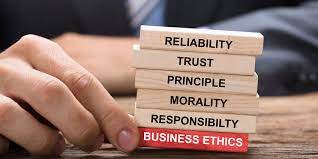
5. Role of Ethical Leadership
Setting the Tone: Ethical leaders establish a culture of integrity, setting an example through their actions and decisions.
Ethical Decision-Making: Encouraging open dialogue and providing guidance to navigate ethical quandaries within the organization.

6. Ethics in Global Business
Cultural Sensitivity: Adapting ethical practices considering cultural nuances and differences across global markets.
Supply Chain Ethics: Ensuring ethical practices are maintained throughout the supply chain, addressing labor conditions, environmental impacts, and fair trade practices.

7. Legal and Regulatory Compliance
Adherence to Laws: Complying with legal requirements and regulations, ensuring business practices align with ethical and legal standards.
Ethical Codes of Conduct: Developing and implementing ethical codes and policies within the organization to guide behavior.
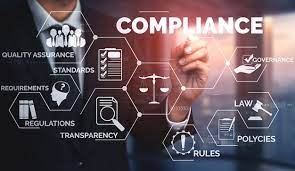
8. Continuous Improvement and Ethical Evolution
Ethical Training: Providing ongoing education and training on ethical standards and dilemmas, fostering a culture of continuous improvement.
Feedback Mechanisms: Establishing mechanisms for employees to report ethical concerns and ensuring their resolution.

9. Ethical Risk Management
Ethics Audits: Conducting regular ethics audits to identify and mitigate potential ethical risks within the organization.
Risk Mitigation Strategies: Developing protocols to manage and mitigate risks associated with unethical behavior, ensuring proactive measures are in place.

10. Ethical Decision-Making Models
Ethical Framework Integration: Implementing comprehensive decision-making models within the organization that blend various ethical perspectives.
Case Studies and Analysis: Using real-world case studies to analyze and train employees on ethical decision-making in complex scenarios.
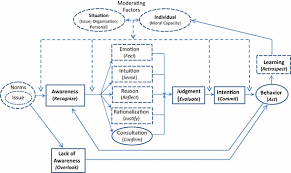
11. Ethical Use of Technology and Data
Data Privacy and Security: Ensuring ethical handling and protection of sensitive data, respecting user privacy and compliance with data protection laws.
AI and Ethics: Implementing AI ethically, addressing biases and ensuring fairness in algorithms and automated decision-making.

12. Ethical Marketing and Advertising
Truth in Advertising: Adhering to truthfulness and accuracy in marketing messages, avoiding deceptive or manipulative tactics.
Socially Responsible Marketing: Engaging in marketing practices that align with societal values and contribute positively to communities.
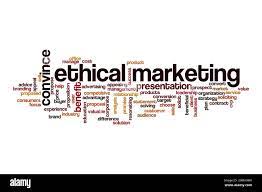
13. Ethical Supply Chain Management
Supplier Code of Conduct: Enforcing ethical standards within the supply chain, ensuring suppliers adhere to responsible practices.
Sustainability Initiatives: Collaborating with suppliers to promote sustainable and ethical sourcing of materials and labor practices.

14. Ethical Leadership and Organizational Culture
Ethical Role Modeling: Promoting ethical leadership, empowering leaders to model ethical behavior and values throughout the organization.
Culture Reinforcement: Embedding ethical principles within the organizational culture, aligning values with actions and policies.

15. Ethical Reporting and Transparency
Transparent Communication: Providing clear and transparent reporting on ethical practices, successes, and challenges.
Stakeholder Engagement: Engaging stakeholders through transparent communication on ethical matters, fostering trust and accountability.

16. Ethical Entrepreneurship and Innovation
Ethical Innovation Practices: Encouraging innovation that aligns with ethical principles, ensuring responsible development and deployment of new technologies.
Entrepreneurial Responsibility: Embracing ethical considerations in entrepreneurial ventures, prioritizing social impact alongside profit.
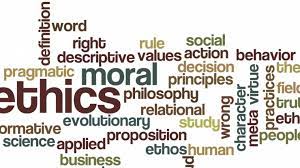
Conclusion:
Business ethics form the cornerstone of responsible and sustainable business practices. By addressing advanced considerations like risk management, technological ethics, marketing responsibility, and ethical leadership, organizations can foster a culture of integrity and trust, driving success while positively impacting society and the environment.
Advanced considerations in business ethics encompass a spectrum of complexities, from technology ethics to supply chain responsibility and ethical leadership. Prioritizing these facets ensures a holistic approach to ethical conduct, reinforcing trust, sustainability, and responsible business practices within organizations.


You must be logged in to post a comment.